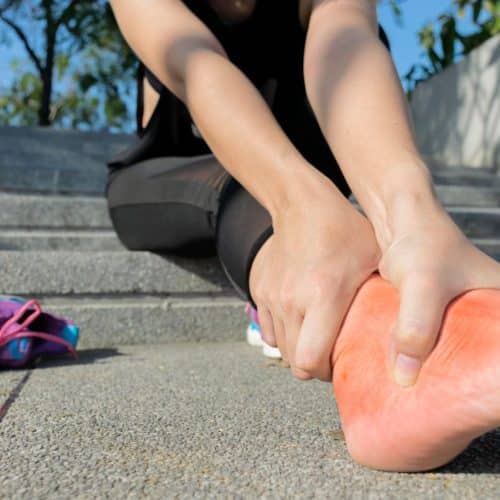Do you often hesitate to take the stairs or engage in physical activities due to weak knees? If so, you’re not alone. Knee pain and weakness can significantly impact our daily lives and hinder us from enjoying the activities we love.
But fear not because, in this article, we have the ultimate guide to help you strengthen your knees and regain mobility. Whether you’re an athlete looking to prevent injuries or simply someone seeking better knee health, we’ve got you covered with practical and effective solutions.
Understanding Knee Anatomy
Before delving into knee-strengthening exercises, it’s crucial to have a comprehensive understanding of the knee’s anatomy. The knee joint is a complex structure that plays a pivotal role in supporting our body weight, enabling smooth movement, and maintaining balance. Comprehending the various components of the knee will help you better appreciate its functions and guide you in adopting a more informed approach towards knee health.
1. The Bones of the Knee
At the core of the knee joint are three key bones that come together to form this remarkable hinge-like structure. The femur, commonly known as the thigh bone, is the longest and strongest bone in the human body. This bone extends from the hip joint and terminates at the knee joint, providing a stable foundation for upper body support and locomotion.
Opposite the femur lies the tibia, also known as the shin bone. The tibia is the larger of the two bones in the lower leg and serves as the main weight-bearing bone of the knee joint. Its strategic alignment with the femur allows it to bear most of the body’s weight, making it an essential element in knee stability.
The third bone involved in the knee joint is the patella, commonly called the kneecap. The patella is a flat, triangular-shaped bone at the knee’s front. It acts as a protective shield for the knee joint, covering the underlying structures. It also plays a crucial role in enhancing the mechanical advantage of the quadriceps muscle during knee movements.
2. The Ligaments and Tendons
A network of ligaments and tendons is present to maintain the structural integrity of the knee joint and facilitate smooth movements. Ligaments are robust, fibrous connective tissues that serve as strong bands, connecting bones to other bones. In the context of the knee joint, there are four primary ligaments:
- Anterior Cruciate Ligament (ACL): The anterior cruciate ligament (ACL) is a ligament that runs diagonally across the knee joint and connects the tibia to the femur. It does this by preventing the tibia from sliding too far forward with respect to the femur, which is an important part of its function of stabilising the knee during rotational motions.
- Posterior Cruciate Ligament (PCL): Similar to the ACL, the PCL is inside the knee joint and connects the femur to the tibia. It also crosses diagonally but in the opposite direction of the ACL. The PCL helps prevent the tibia from sliding too far backward in relation to the femur.
- Medial Collateral Ligament (MCL): The MCL is positioned on the inner side of the knee joint and connects the femur to the tibia. It provides stability to the inner knee and resists forces that could push the knee sideways.
- Lateral Collateral Ligament (LCL): The LCL is located on the outer side of the knee joint, connecting the femur to the fibula (a smaller bone in the lower leg). It stabilises the outer knee and resists forces that might push the knee sideways.
Tendons, conversely, are tough, fibrous cords that connect muscles to bones, allowing for the transmission of force and enabling movement. In the knee joint, the patellar tendon is a critical tendon that connects the patella to the tibia. This tendon works with the quadriceps muscles to straighten the knee during walking, running, and jumping.
A solid understanding of the knee’s anatomy is essential when engaging in exercises or activities involving the knee joint. By respecting the structure and function of this complex joint, you can take proactive measures to strengthen and protect your knees, ensuring optimal mobility and overall well-being.
Low-Impact Exercises
When it comes to strengthening your knees, low-impact exercises are a safe and effective option. These exercises are designed to minimise knee joint stress while providing excellent health benefits. Incorporating low-impact exercises into your fitness routine can be particularly beneficial for individuals with knee pain, arthritis or those recovering from knee injuries.
Let’s explore some of the best low-impact exercises for knee strength and overall joint health:
1. Swimming
Swimming is a fantastic full-body workout with minimal knee and joint stress. The buoyancy of water reduces the impact on your knee joints, making it an ideal exercise for individuals with knee issues. Whether you swim laps, do water aerobics, or simply move around in the pool, swimming helps build cardiovascular endurance and strengthens the muscles surrounding the knees.
Swimming engages various muscle groups, including the quadriceps, hamstrings, calves, and glutes, which all significantly support knee stability. Moreover, the rhythmic motions of swimming promote joint flexibility, reducing the risk of stiffness and discomfort.
2. Cycling
Cycling is another low-impact exercise that can do wonders for your knee health. Whether you prefer outdoor cycling or a stationary bike, this activity allows you to work on knee strength without subjecting your joints to excessive pressure. Cycling primarily targets the quadriceps, crucial for knee stability and function.
When cycling, your knees move through a controlled range of motion, which helps lubricate the joint and reduce friction. Additionally, cycling can be easily adjusted to suit your fitness level, making it an accessible exercise for individuals of all ages and abilities.
3. Elliptical Training
Using an elliptical trainer is an excellent way to engage in weight-bearing exercise without impacting the knees. An elliptical machine mimics walking or running, but your feet never leave the pedals, reducing the stress on your joints. This makes it an ideal option for people looking to improve cardiovascular fitness and leg strength while minimising knee strain.
The elliptical machine allows you to adjust the resistance and incline, providing a customisable workout that accommodates varying fitness levels. This exercise primarily targets the quadriceps, hamstrings, and glutes, contributing to knee stability.
4. Yoga
Yoga is a gentle yet effective way to enhance knee strength and flexibility. Yoga poses focus on body alignment, balance, and controlled movements, which can benefit the knees. Engaging in regular yoga sessions helps strengthen the muscles around the knee joint, supporting its stability and reducing the risk of injury.
Poses such as Warrior II, Bridge, and Chair Pose are particularly beneficial for targeting the muscles of the thighs, hamstrings, and calves. Additionally, yoga promotes relaxation and reduces stress, indirectly benefiting knee health by minimising muscle and joint tension.
5. Tai Chi
Tai Chi is a traditional Chinese martial art that emphasises slow, controlled movements and deep breathing. It is often described as “meditation in motion.” Tai Chi is exceptionally gentle on the knees, making it an excellent choice for those with knee pain or limited mobility.
This ancient practice helps improve balance, coordination, and muscle strength, particularly in the lower body. The slow, flowing movements in Tai Chi encourage joint flexibility and promote better circulation, improving knee function and reducing discomfort.
6. Seated Exercises
For individuals with severe knee pain or mobility issues, seated exercises provide a viable option for maintaining physical activity while protecting the knees. Seated exercises include leg lifts, ankle circles, and seated leg extensions.
These exercises target the muscles of the legs without putting weight on the knees. Seated exercises are often recommended during rehabilitation after a knee injury or surgery, gradually helping to rebuild strength and range of motion safely and controlled.
7. Walking
Walking is a simple and accessible low-impact exercise that offers numerous health benefits, including improved cardiovascular health and strengthened leg muscles. When walking, use shoes that provide adequate support and cushioning to minimise the impact on the knees.
Aim for a brisk walk, maintaining a steady pace that elevates your heart rate without causing strain on your knees. Walking on even and relatively soft surfaces, such as grass or a track, can be kinder to your knees than on hard concrete or pavement.
8. Cross-Training
Cross-training involves incorporating a variety of low-impact exercises into your fitness routine. By diversifying your workouts, you can engage different muscle groups, reduce the risk of overuse injuries, and keep your exercise routine interesting.
Combining activities like swimming, cycling, yoga, and walking allows you to target various muscles while giving your knees a break from repetitive movements. Cross-training promotes overall body strength and fitness while supporting joint health.
Strengthening Exercises
In addition to low-impact exercises, targeted knee-strengthening exercises can improve knee stability and overall joint health. These exercises specifically target the muscles surrounding the knee joint, enhancing their strength and flexibility to provide better support and protection. When performed correctly and regularly, strengthening exercises can significantly reduce the risk of knee injuries and alleviate knee pain. Let’s explore some effective knee-strengthening exercises:
1. Leg Raises
Leg raises are a simple yet powerful exercise for strengthening the quadriceps muscles, essential for knee stability and function. To perform leg raises:
- Lie on a comfortable surface, such as a yoga mat or a flat bench. Keep your legs extended in front of you.
- Bend one knee and plant the foot firmly on the ground while keeping the other leg straight.
- Engage your core muscles to stabilise your body and prevent excessive movement in the lower back.
- Lift the straight leg off the ground a few inches, keeping it parallel to the bent leg. Hold this position for a few seconds.
- Gently lower the leg back down to the starting position.
- Repeat the same movement with the opposite leg.
Perform several sets of leg raises on each leg, gradually increasing the number of repetitions as your strength improves.
2. Step-Ups
Step-ups are excellent for strengthening the quadriceps, hamstrings, and gluteal muscles, supporting knee stability during various movements. Here’s how to do step-ups:
- Stand facing a sturdy step, bench, or platform with your feet shoulder-width apart.
- Place one foot firmly on the step, ensuring your knee is at a 90-degree angle or slightly bent.
- Push through the heel of the elevated foot and lift your body onto the step.
- Bring the opposite foot up on the step to join the first foot.
- Step down one foot at a time, returning to the starting position.
- Repeat the same movement, leading with the opposite foot.
You can hold dumbbells or kettlebells in each hand while performing step-ups to add intensity. Gradually increase the height of the step as your strength improves.
3. Wall Squats
Wall squats are effective for targeting the quadriceps, hamstrings, and gluteal muscles while enhancing overall lower body strength. To do wall squats:
- Stand with your back against a wall and your feet shoulder-width apart, about two feet from the wall.
- Lower your body into a squat position by bending your knees and sliding your back down the wall.
- Continue to lower yourself until your thighs are parallel to the ground or as far as your comfort allows.
- Hold this position for 20 to 30 seconds, keeping your back against the wall and your knees aligned with your toes.
- Push through your heels to return to a standing position.
- Repeat the exercise for several repetitions.
4. Hamstring Curls
Hamstring curls are effective for targeting the hamstrings and improving knee stability. You can perform this exercise using either resistance bands or a machine at the gym. Here’s how to do hamstring curls with resistance bands:
- Attach the resistance band to a sturdy anchor point, such as a door handle or the leg of a heavy piece of furniture.
- Lie face down on the ground with your legs extended and the resistance band looped around one ankle.
- Bend your knee and flex your foot, pulling the heel towards your glutes while keeping the upper leg aligned with your body.
- Slowly lower your leg back to the starting position.
- Perform the same movement on the opposite leg.
Do several sets of hamstring curls on each leg, gradually increasing the resistance as your strength improves.
5. Calf Raises
Calf raises help to strengthen the calf muscles, indirectly supporting knee stability. To perform calf raises:
- Stand with your feet hip-width apart, near the edge of a step or a raised platform.
- Raise your heels off the ground, lifting your body onto the balls of your feet.
- Hold this position for a few seconds, feeling your calf muscles contract.
- Lower your heels back down to the starting position.
- Repeat the movement for several repetitions.
To add intensity, you can perform calf raises with one leg at a time or hold dumbbells in each hand.
Maintaining a Healthy Weight
Maintaining a healthy weight is essential for overall well-being and promotes optimal knee health. Excess body weight can stress the knee joints significantly, leading to accelerated wear and tear and an increased risk of knee pain and injuries.
By adopting a balanced and mindful approach to nutrition and physical activity, you can achieve and sustain a healthy weight, reducing the burden on your knees and improving their long-term function. Here are some strategies to help you maintain a healthy weight and support your knee health:
1. Balanced Diet
A balanced and nutritious diet is the foundation of maintaining a healthy weight. Focus on incorporating a variety of nutrient-dense foods into your meals, including:
- Vegetables and Fruits: These are rich in vitamins, minerals, and fibre but low in calories. Aim to fill half your plate with colourful vegetables and fruits.
- Lean Proteins: Include sources of lean proteins such as poultry, fish, tofu, legumes, and low-fat dairy in your diet. Proteins help with muscle repair and maintenance.
- Whole Grains: Choose brown rice, quinoa, whole wheat, and oats over refined grains. Whole grains provide more fibre and nutrients, keeping you feeling fuller for longer.
- Healthy Fats: Incorporate sources of healthy fats like avocados, nuts, seeds, and olive oil into your diet. Healthy fats are essential for overall health and can help control appetite.
- Hydration: Stay hydrated by drinking plenty of water throughout the day. Sometimes, thirst can be mistaken for hunger.
2. Portion Control
In addition to eating a balanced diet, be mindful of portion sizes. Even with healthy foods, overeating can consume more calories than your body needs. Use smaller plates and take the time to savour your meals, paying attention to your body’s hunger and fullness cues.
3. Regular Physical Activity
Participating in regular physical exercise is essential to both supporting knee health and keeping a healthy weight. As was said before, knees may be strengthened without putting an excessive amount of pressure on the joints through the use of low-impact activities such as swimming, cycling, and yoga. These exercises are wonderful examples. As a goal for each week, try to complete at least 150 minutes of aerobic exercise with a moderate effort or 75 minutes of aerobic activity with a vigorous intensity. This is the recommendation made by health experts.
4. Strength Training
Incorporating strength training exercises into your fitness routine can help build muscle mass and boost metabolism, contributing to weight management. As you build muscle, your body becomes more efficient at burning calories, even at rest. For a well-rounded strength training program, focus on targeting various muscle groups, including the legs, core, and upper body.
5. Mindful Eating
Practising mindful eating can help you develop a healthier relationship with food and prevent overeating. Pay attention to hunger and fullness cues, eat slowly, and savour the flavours of your meals. Avoid distractions while eating, such as watching TV or using electronic devices, as this can lead to mindless overeating.
6. Get Adequate Sleep
It is quite necessary to get enough amount of sleep in order to keep a healthy weight. The hormones that regulate hunger and appetite are regulated to a large extent by sleep, which is why sleep is so important. These hormones can be disrupted by a lack of sleep, which can lead to increased food cravings and overeating. Your efforts to manage your weight will be supported by getting between 7 and 9 hours of decent sleep every night.
7. Seek Professional Guidance
If you find it challenging to manage your weight independently, consider seeking guidance from a registered dietitian or a healthcare practitioner. They can create a personalised plan considering your needs, preferences, and health conditions.
Avoiding Overexertion
While regular exercise is essential for strengthening the knees and promoting overall health, avoiding overexertion and excessive strain on the knee joints is equally important. Overexertion can lead to acute injuries, exacerbate existing knee conditions, and hinder recovery.
By being mindful of your body’s limits and following some practical guidelines, you can protect your knees and ensure your exercise routine remains safe and effective. Here are some tips for avoiding overexertion:
1. Gradual Progression
When starting a new exercise program or increasing the intensity of your workouts, it’s crucial to progress gradually. Sudden spikes in activity can put excessive stress on the knees, leading to discomfort and potential injuries. Whether incorporating new exercises or increasing the duration and intensity of your existing workouts, do so in small increments over time. This allows your body, including your knees, to adapt and strengthen without strain.
2. Listen to Your Body
Paying attention to your body’s signals is essential in avoiding overexertion. If you experience pain, discomfort, or unusual sensations in your knees during exercise, it’s essential to stop and assess the situation. Pain should never be ignored or pushed through, as it can indicate an underlying issue. If you encounter persistent or severe knee pain, it’s best to consult a podiatrist to identify the cause and receive appropriate guidance.
3. Warm-Up and Cool-Down
Before engaging in any exercise, ensure you warm up properly. A warm-up routine prepares your body for physical activity by gradually increasing blood flow to the muscles and joints. This can reduce the risk of strain and injury during your workout. Gentle dynamic stretches, light cardio, and mobility exercises can be incorporated into your warm-up.
Similarly, after completing your exercise session, take the time to cool down. A cool-down helps gradually lower your heart rate and allows your muscles to recover more effectively. Cool-down routines can include Gentle static stretches to improve flexibility and reduce muscle tension.
4. Cross-Training
Engaging in various exercises through cross-training can help prevent overexertion on specific muscle groups, including the knees, instead of repeatedly performing high-impact exercises that put excessive knee stress, mix in low-impact activities like swimming, cycling, or yoga. This diversification allows your knees to recover and adapt while maintaining an active lifestyle.
5. Rest and Recovery
Rest and recovery are essential to any exercise program, especially regarding knee health. Adequate rest allows your body to repair and strengthen the muscles and connective tissues around the knees. Incorporate rest days into your weekly routine, and avoid consecutive days of intense exercise that focus on the same muscle groups.
6. Modify Intensity
Modifying exercise intensity is crucial if you’re dealing with knee pain or have a history of knee injuries. For instance, you can perform low-impact versions of high-impact exercises or reduce weight or resistance during strength training. Listen to your body and be willing to make adjustments to protect your knee joints while still achieving your fitness goals.
Conclusion
Taking care of your knees is essential for maintaining an active and pain-free lifestyle. Whether you’re an athlete, fitness enthusiast, or simply someone who wants to stay mobile and independent as you age, focusing on knee strength should be a top priority. This comprehensive guide explored various effective ways to strengthen your knees and improve their overall health. Remember, it’s never too late to start caring for your knees; the benefits will be well worth the effort.
Now that you’ve gained valuable insights into strengthening your knees, it’s time to take action! Reflect on the information provided in this blog and consider how you can incorporate knee-strengthening exercises into your daily routine. What low-impact activities will you add to your schedule? How will you ensure proper form during your workouts? Share your thoughts and plans in the comments below; let’s inspire each other to healthier, happier knees!
In conclusion, investing time and effort in strengthening your knees is an investment in your overall well-being. With consistency, patience, and a proactive approach, you can safeguard your knee health and enjoy an active lifestyle for years. Remember, every step you take towards healthier knees is towards a better quality of life. Let’s prioritise knee care and embrace the joy of pain-free movement!
Content Summary
- You can take charge of your knee health in just a few simple steps.
- Strengthening exercises, proper nutrition, and smart lifestyle choices can work wonders for your knees.
- Learn how to perform targeted exercises to build the muscles supporting your knees, and discover foods promoting joint health and reducing inflammation.
- Whether you’re a fitness enthusiast or looking to improve your daily movements, this article will equip you with practical strategies to strengthen your knees effectively.
- Before delving into knee-strengthening exercises, it’s crucial to have a comprehensive understanding of the knee’s anatomy.
- The anterior cruciate ligament (ACL) is a ligament that runs diagonally across the knee joint and connects the tibia to the femur.
- A solid understanding of the knee’s anatomy is essential when engaging in exercises or activities involving the knee joint.
- When it comes to strengthening your knees, low-impact exercises are a safe and effective option.
- Cycling is another low-impact exercise that can do wonders for your knee health.
- Using an elliptical trainer is an excellent way to engage in weight-bearing exercise without impacting the knees.
- Engaging in regular yoga sessions helps strengthen the muscles around the knee joint, supporting its stability and reducing the risk of injury.
- Tai Chi is a traditional Chinese martial art that emphasises slow, controlled movements and deep breathing.
- For individuals with severe knee pain or mobility issues, seated exercises provide a viable option for maintaining physical activity while protecting the knees.
- Cross-training involves incorporating a variety of low-impact exercises into your fitness routine.
- In addition to low-impact exercises, targeted knee-strengthening exercises can improve knee stability and overall joint health.
- Lie on a comfortable surface, such as a yoga mat or a flat bench.
- You can hold dumbbells or kettlebells in each hand while performing step-ups to add intensity.
- Wall squats are effective for targeting the quadriceps, hamstrings, and gluteal muscles while enhancing overall lower body strength.
- Stand with your back against a wall and your feet shoulder-width apart, about two feet from the wall.
- Hamstring curls are effective for targeting the hamstrings and improving knee stability.
- Attach the resistance band to a sturdy anchor point, such as a door handle or the leg of a heavy piece of furniture.
- Do several sets of hamstring curls on each leg, gradually increasing the resistance as your strength improves.
- Maintaining a healthy weight is essential for overall well-being and promotes optimal knee health.
- By adopting a balanced and mindful approach to nutrition and physical activity, you can achieve and sustain a healthy weight, reducing the burden on your knees and improving their long-term function.
- A balanced and nutritious diet is the foundation of maintaining a healthy weight.
- In addition to eating a balanced diet, be mindful of portion sizes.
- Participating in regular physical exercise is essential to both supporting knee health and keeping a healthy weight.
- Incorporating strength training exercises into your fitness routine can help build muscle mass and boost metabolism, contributing to weight management.
- Practising mindful eating can help you develop a healthier relationship with food and prevent overeating.
- It is quite necessary to get enough amount of sleep in order to keep a healthy weight.
- By being mindful of your body’s limits and following some practical guidelines, you can protect your knees and ensure your exercise routine remains safe and effective.
- Paying attention to your body’s signals is essential in avoiding overexertion.
- Before engaging in any exercise, ensure you warm up properly.
- Modifying exercise intensity is crucial if you’re dealing with knee pain or have a history of knee injuries.
- Taking care of your knees is essential for maintaining an active and pain-free lifestyle.
- This comprehensive guide explored various effective ways to strengthen your knees and improve their overall health.
- Remember, it’s never too late to start caring for your knees; the benefits will be well worth the effort.
- Now that you’ve gained valuable insights into strengthening your knees, it’s time to take action!
- Reflect on the information provided in this blog and consider how you can incorporate knee-strengthening exercises into your daily routine.
- In conclusion, investing time and effort in strengthening your knees is an investment in your overall well-being.
FAQs
1. Can I do knee-strengthening exercises if I have knee pain?
If you have knee pain, it’s essential to consult with a podiatrist before attempting knee-strengthening exercises. Some exercises may aggravate your condition, while others could be beneficial with modifications.
2. How often should I perform knee-strengthening exercises?
It’s recommended to perform knee-strengthening exercises at least three times a week. However, the frequency and intensity may vary depending on your fitness level and any existing knee issues.
3. Can strengthening my knees prevent knee injuries?
Yes, strengthening the muscles around your knees can provide better support and stability, reducing the risk of knee injuries during physical activities.
4. Are there any lifestyle changes that can improve knee health?
Maintaining a healthy diet, staying hydrated, and avoiding activities that place excessive knee stress can improve knee health.
5. Is it necessary to warm up before knee exercises?
Warming up before knee exercises is essential to prepare the muscles and joints for the activity, reducing the risk of injury. Incorporate gentle stretches and light movements as part of your warm-up routine.










